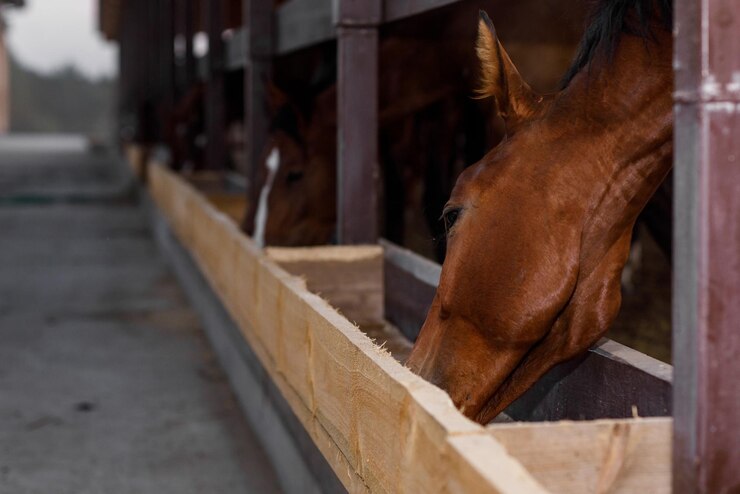When it comes to feeding horses, one of the most debated topics is whether corn is a suitable option. The question, is corn good for horses, often arises among horse owners and enthusiasts. Understanding the nutritional value of corn and its effects on equine health is crucial for making informed decisions.

The Nutritional Profile of Corn
Corn is a common feed ingredient due to its availability and energy content. It is rich in carbohydrates, which provide a significant energy boost. However, it is essential to weigh the benefits against potential drawbacks when considering corn in a horse’s diet.
Carbohydrate Content
Corn is high in starch, a type of carbohydrate that can be rapidly converted to glucose. While this can provide quick energy, excessive starch intake may lead to digestive issues such as colic or laminitis. It is essential to balance corn with other feed types to ensure a well-rounded diet.
Protein and Fiber Levels
Compared to other grains, corn has lower protein and fiber content. Horses require adequate protein for muscle development and fiber for healthy digestion. Therefore, corn should not be the sole grain in a horse’s diet.
Benefits of Feeding Corn to Horses
Despite some concerns, corn can be beneficial when fed in moderation. For horses with high energy demands, such as performance horses, corn can supply the necessary calories to support their activities.
High-Calorie Source
Corn is a dense source of calories, making it useful for underweight horses or those needing weight gain. It can be a valuable component of their diet when balanced with other nutritional elements.
Palatability
Many horses find corn palatable, which can be advantageous when trying to entice picky eaters. Mixing corn with other feeds can encourage a horse to consume a more varied diet.
Potential Risks of Corn
While corn has its benefits, there are risks associated with its overconsumption. Understanding these risks can help horse owners use corn effectively and safely.
Digestive Disorders
As previously mentioned, high starch levels can lead to digestive issues. It is crucial to monitor the quantity of corn in a horse’s diet to prevent ailments such as colic or laminitis.
Nutritional Imbalance
Relying too heavily on corn can result in a nutritional imbalance. It lacks certain essential nutrients that horses need, which might require supplementation with balanced feeds or mineral blocks.
For more information on using mineral blocks effectively, visit our mineral blocks guide.
Comparing Corn with Other Grains
When deciding whether corn is suitable, it is helpful to compare it with other grains commonly fed to horses. Each grain offers unique benefits and challenges.
Oats
Oats are higher in fiber and lower in energy compared to corn, making them a safer option for horses prone to metabolic issues. Learn more about feeding horses with metabolic issues by visiting our feeding guide.
Barley
Barley is similar to corn in energy content but has a slightly higher fiber level. It can be a good alternative for horses that need extra energy without excessive starch.
Best Practices for Feeding Corn
To ensure that corn is beneficial rather than harmful, horse owners should follow best practices when incorporating it into their feeding regimen.
Moderation is Key
Feeding corn in moderation is crucial. It should complement, not replace, other essential feed components, ensuring a balanced diet.
Introduce Gradually
When introducing corn to a horse’s diet, do so gradually. This approach allows the horse’s digestive system to adjust, reducing the risk of digestive upset.
Signs Your Horse May Benefit from Corn
Some horses may show signs that indicate they could benefit from the addition of corn to their diet.
Increased Energy Needs
Performance horses or those engaged in rigorous activities may require the extra calories that corn provides. Monitoring their energy levels and weight can help determine if corn is appropriate.
Weight Management
Underweight horses or those struggling to maintain weight might gain from the caloric density of corn. It can be a strategic addition to help them achieve optimal body condition. Learn more about equine body condition scoring by visiting our scoring guide.
Alternatives to Corn
If corn does not suit a horse’s dietary needs, several alternatives can provide similar benefits without the associated risks.
Beet Pulp
Beet pulp is high in fiber and provides a steady energy source without the risk of starch-related issues. It can be an excellent option for horses sensitive to grains.
Rice Bran
Rice bran offers a high-fat content, providing energy without the starch found in corn. It is often used for weight gain and improving coat condition.
Conclusion
Feeding corn to horses can be beneficial when done correctly. Understanding the nutritional content and potential risks allows horse owners to make informed decisions. Balancing corn with other essential nutrients is key to promoting optimal health and performance in horses.
For further insights into horse nutrition, check out this external resource on dietary deficiencies.

FAQ
How much corn can I feed my horse per day?
The amount of corn varies based on the horse’s size, age, and activity level. Consulting with a veterinarian or equine nutritionist is recommended to determine the appropriate amount.
Can corn cause colic in horses?
Feeding large quantities of corn can lead to digestive issues, including colic. It is crucial to feed corn in moderation and monitor your horse’s health closely.
Is there a specific type of corn that is best for horses?
Dent corn is commonly used due to its energy content. However, steam-flaked or cracked corn is often preferred as it is easier for horses to digest.
This article contains affiliate links. We may earn a commission at no extra cost to you.
